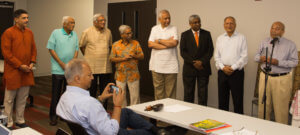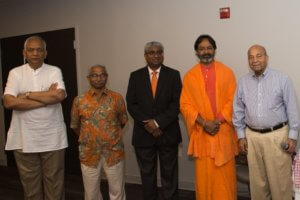
There is no single solution to the challenge of cultivating better narratives, methods, and paradigms to improve and expand the understanding of Hinduism and Hindus.
“Do you speak Hindu?”
“Are you Shia or Sunni Hindu?”
“What caste are you?”
These questions, unintentionally frustrating as they might be, are a feature of being Hindu in America. They are also the reason why my answer to the importance for Hindu Studies in academic environments is an emphatic yes.
In spite of being practitioners of the third largest religion and one of the oldest surviving family of philosophies and traditions, a survey by Pew Research Institute found that Americans as a whole know little about Hinduism, and those who know something or think they know something, have ambivalent impressions of Hindu Americans. At the same time, the popularity of Hindu practices like yoga and ayurveda continue to skyrocket, but are intentionally delinked from Hinduism. And scientific inquiry in quantum physics or cognitive psychology are increasingly converging with Vedantic understandings of reality and Consciousness, yet acknowledgement of Hinduism is all too often missing.
There are some 3.5 million Hindus living in America, several million across other diasporas, and over a billion in the Indian subcontinent. We live in diverse and pluralistic societies across the globe. The world is becoming smaller as a result of mass communication and globalization. Considering all of these realities, it becomes imperative that who we are as a people and how we engage with the world is understood.
One way to do that is through the academic study of Hinduism. Unfortunately, the current state of Hindu studies, built as it is on the foundation of Christian frameworks about religion and history, rather than provide accurate and nuanced understandings of Hindu history, teachings, and traditions, perpetuate outright fallacies and harmful stereotypes.
There is no single solution to the challenge of cultivating better narratives, methods, and paradigms to improve and expand the understanding of Hinduism and Hindus. But here are a few that I believe are feasible:
1. Support through academic grants scholars committed to the study of Hinduism as a lived tradition who:
- highlight emic understandings;
- explore lesser known aspects of Hindu history, philosophy or traditions;
- expose biases in dominant paradigms and methods;
- develop new paradigms and methods to study Hinduism; or
- engage in the comparative study of religion. Given that we do not want, appreciate, nor find constructive oversimplifications or broad brushstrokes about the Hindu traditions, Hindus must gain more nuanced understandings of Christianity, Islam, Judaism, etc. which can pave way for deeper understandings of Hinduism through thoughtful comparative studies.
2. Call out bias and advocate for higher standards in the various academies engaged in the study of religion, history, etc. For example, see my call to the American Academy of Religions to adopt a code of academic integrity: Academic Integrity: It’s What’s Missing at the AAR
3. Build bridges between academics, activists, and communities with other previously colonized civilizations or countries working through their own decolonizing processes to exchange ideas, share best practices, do comparative work, and cooperate constructively.
4. Encourage more second and third generation Hindu Americans to pursue the academic study of not only religion, but history and other humanities and social sciences. This cannot be done in a vacuum. It will require investment in our own svadhyaya, sadhana, and positive identity building as contributing members of our respective families, communities, and sanghas, sampradayas, or mathas.
5. Encourage more second and third generation Hindu Americans to pursue the academic study of not only religion, but history and other humanities and social sciences. This cannot be done in a vacuum. It will require investment in our own svadhyaya, sadhana, and positive identity building as contributing members of our respective families, communities, and sanghas, sampradayas, or mathas.
References
1. “What Americans Know About Religion.” Pew Research Center, Washington, D.C. (July 23, 2019)
2. Shukla, Suhag A. Web log. Academic Integrity: It’s What’s Missing at the AAR (blog).
This blog is an adaptation of a term paper submitted for the Fall 2020 quarter of Orientation to Hindu Studies (HSF 5000)










